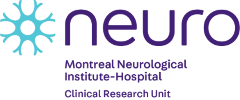Cutting-edge gene therapy could help slow young-onset Frontotemporal Dementia

Individuals with FTD due to progranulin mutation sought for this study
Sophie Lorenzo
December 11, 2023
It sounds like something out of science fiction: a neurosurgeon injecting a treatment into a patient’s neck so that it crosses the blood brain barrier. But this isn’t a movie, it’s a new gene therapy — a promising line of treatment that is being explored as a potential avenue to treat dementia.
The Neuro is the only site in Quebec taking part in a Phase I clinical trial testing this potentially groundbreaking treatment that hopes to slow or stop an inherited form of Frontotemporal Dementia (FTD). The study is the first gene therapy trial for dementia conducted in Canada.
The trial is specifically for patients with FTD who have a mutation in the GRN gene, that stops them from producing enough progranulin — a protein crucial for brain function.
Taking Aim
“Most forms of dementia are multifactorial; it is a complicated disease, and addressing one factor may not make a substantial impact. There is a much higher likelihood that we will find cure for a genetic form of the disease that has a single well-identified cause. If you can impact that factor, the hope is that you can dramatically slow it down or reverse the dementia. That’s what we are looking to do here,’’ says Dr. Simon Ducharme, a neuropsychiatrist and clinician-scientist at The Neuro (Montreal Neurological Institute-Hospital) who is the principal investigator for the study in Montreal.
The Alzheimer Society of Canada estimates that 5 to 10% of all dementia cases are FTD – the disease with which Bruce Willis was recently diagnosed. It is a young-onset dementia and the most common form in people under 60. Early signs including marked changes in personality and judgment, followed by increasing problems with language as well as movement disorders, such as tremors, muscle stiffness and slow movement. The average survival after neurocognitive changes is just 8 years.
Genetic mutations make up about a quarter of cases of FTD, of which 5-10% are due to GRN mutations. Almost all individuals with the GRN mutation will go on to develop the disease. And because this is a genetic version of the disease, affected individuals have a 50% chance pass it down to each of their children.
One-Time Treatment
The treatment being tested is viral vector-based gene therapy. Viral vectors have been increasingly used in the past 5 years. They are an inactivated virus which is used as a vehicle to carry a working gene to a cell.
“This is very exciting; it is true gene therapy. It is a one-time dose and theoretically the effect is dramatic and long lasting, similar to the treatments we have seen approved recently for Spinal Muscular Atrophy (SMA),” says Dr. Ducharme.
The therapy being tested hopes that by delivering a working copy of the GRN gene, the body can then go on to increase the production of progranulin protein.
“The idea is that even if the disease is present the progression could be stopped in its tracks. You could have a patient who has progressed but who would benefit by maintaining their quality of life without further deterioration. One day, if treatments like this one are successful, the treatment might extend to those with the mutation prior to symptom onset to spare them from developing this condition,” concludes Dr. Ducharme.
Individuals between 35 and 75 diagnosed with FTD can reach out to the Clinical Research Unit at The Neuro at 514-398-5500 or neurocog-CRU.neuro@mcgill.ca. Travel from outside the province can be covered by the trial.



